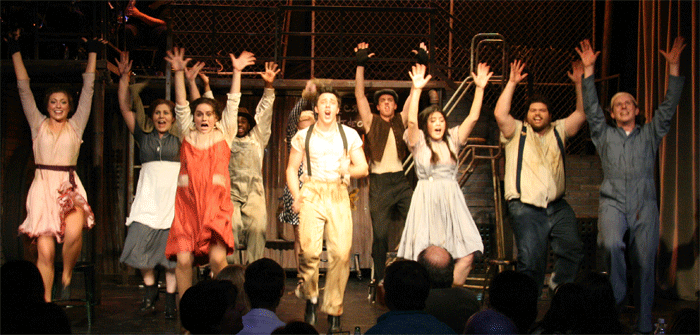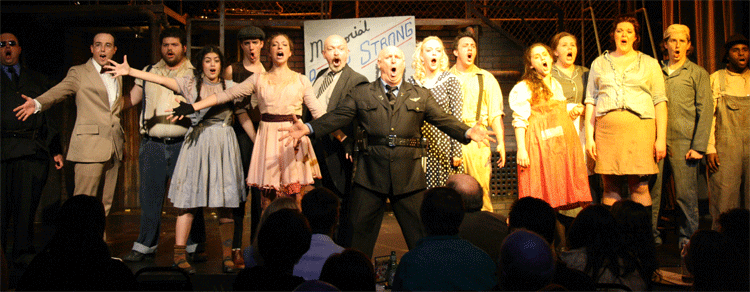OC Register review
'Urinetown'
flush with raw energy
Review: Maverick Theater's lively staging delivers the campy goods on the 2001 musical.
By ERIC MARCHESE
Could anyone who's never seen "Urinetown" expect more than toilet and bodily elimination jokes? Could they dare hope for more?
Those who presume the title of Greg Kotis and Mark Hollmann's 2001 satire means an evening of pee-pee jokes are in for a pleasant surprise, especially if they're up on their musical theater. For its witty deconstruction of the musical-theater genre, the play snagged three Tony Awards out of nine nominations.
The Maverick Theater's new staging bursts with energy from the get-go. Even those who've never seen "Les Misérables," "West Side Story" or "Fiddler on the Roof" can enjoy "Urinetown" on its own merits – deliciously campy lyrics (by Kotis and Hollmann), songs (by Hollmann) ranging from soft-shoe to gospel, and a libretto (by Kotis) where characters break the fourth wall, informing us they're in a play.
Darren Levens' staging amplifies all of the show's basic conceits and its goofy, broadly parodistic sensibility. His leads and supporting players are solid and in some cases spectacular while his ensemble fearlessly delivers the raw energy and intense physicality "Urinetown" requires.
He and producer Brian Newell use the Maverick's less formal cabaret stage over its conventional proscenium, their compact production making inventive use of the cabaret room's lengthy bar, and their set and Heidi Newell's costumes creating a grimy visual look that bolsters the dynamic cast.
For those not in the know, "Urinetown" depicts a dark future America where a 20-year drought has forced private toilets to be outlawed. UGC (Urine Good Company) controls the public restrooms, charging ever-higher fees for their use – a policy that hits the downtrodden the hardest. Anyone caught urinating in public is hauled off to Urinetown, a sinister land from whose borders no one has ever returned.
With its social conscience and echoes of the Depression era, "Urinetown" takes on the coloration of that period's Group Theatre and Federal Theatre Project, while its often dark songs recall the many biting collaborations of Bertolt Brecht and Kurt Weill, with bits of Gorki's "The Lower Depths" added for good measure.
Sound too dark, too preachy? Fear not, because "Urinetown" is also achingly funny, making a mockery of the process of theater itself while shooting down our deeply ingrained expectations that, just because it's a musical, "Urinetown" will have a happy ending.
Spoofing the sappiness of many a musical's romantic leads are star-crossed would-be lovers Bobby Strong and Hope Cladwell – Bobby the custodian of the city's filthiest public amenity, who rises up in rebellion against the system, Hope the naive daughter of Caldwell B. Cladwell, UGC's evil CEO.
As Bobby, Shaun Leslie Thomas is an immensely likable everyman, projecting decency and goodness yet with no traces of being soft or wimpy. Kalinda Gray's Hope is a good-hearted, ditzy blonde who flips easily between light camp and conventional musical-theater ingénue.
Christopher Spencer as Cladwell, with his bald pate and goatee, is a sort of mad scientist of the business world. In a neat touch, Spencer eschews the role's typical bombast, opting instead to depict Cladwell as a snarling, tightly wound dandy. In his narration as Officer Lockstock, Rick Franklin's mock-earnest, pleading voice drips with irony. Lindsay Lee Lusk's pigtails, gingham dress and teddy bear look the part of Little Sally, but her performance projects just one trait – feisty ferocity.
As Miss Pennywise, Clare V. Solly exhibits solid comic timing. She treads the delicate line of milking the material for its camp value without pushing things overboard – a hallmark of Levens' cast. Under Justin Pyne's musical direction, all of the vocals, from leads to chorus, are confident, assured and in sync with the score's musical demands and its comically warped sensibility.
Lindsay Martin's choreography creates a kinetic feel to many of the numbers. From onstage, Pyne leads a five-man band that nails the score without overpowering the vocalists – another secret of this staging's success.
|



